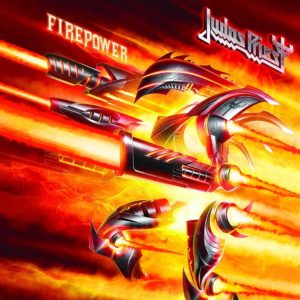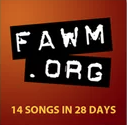
FAWM is February Album Writing Month, a monthlong songwriting and collaborating challenge hosted at fawm.org. The idea is that in the 28 days of February, you are challenged to write 14 songs and, at the end, will have an album’s worth of new music. This was my third year doing it and, frustrated with my previous years’ production (7 and 9 songs respectively), decided to set the bar much higher. My goal was a song a day, but no less than 20. I was shooting for 30, in fact. I didn’t say this at the outset, in case declaring it publicly had some effect on me, and it would have. I felt it the second I said I had 18 completed. At that moment I stopped writing for a few days. More on that in a bit.
During this year’s FAWM I learned some things about myself and my writing process. And honestly, that was the real goal. Here are some of the things I learned.
1. I can absolutely write a song or more a day, even with a busy schedule. Lyrics, that is. I can do it if that’s all I focus on, and if I’m not too precious about the outcome. This part is key. I start a lot of songs. I have a lot of ‘song seeds’ as I call them, either titles or phrases or fragments or even whole verses and choruses of unfinished songs, and now I have even more. What having a goal and a deadline did for me is to say okay, instead of stopping and thinking I’ll someday come back and finish this, just finish it and see where it goes. It doesn’t have to be perfect or phenomenal, it just has to be done.
2. A song can be anything. It can literally be one word, or one line, repeated or not, to music. It can be a pages-long poem. It can have choruses or not; it can have the typical verse-prechorus-chorus structure or not; it can take any form, really, and literally be about anything at all. However, I did find that without the context of music, I was strongly inclined to write something *songlike*, which meant at the very least incorporating some repetition, rhyme, structure of some sort, even if that was forced. On the other hand, setting boundaries and limitations generally helps more than it hurts. But to submit something written and call it a song, to me meant making it at least read like it could be sung.
3. I might be chorus-impaired. Many of the things I spontaneously write could be choruses, but I make them verses because they’re meaty. And because I try to write with some deliberate ambiguity, I find I struggle a bit with concrete titles, and titles are often what the chorus is, repeated. Example: I wrote a song in the backyard full of imagery and a little out of my normal style. It resonated with someone on the FAWM site to the extent that he was compelled to set it to music, and when it came back, he had taken out my chorus and put in something he wrote that was immeasurably better and turned it into a proper song. So I’m rethinking my approach to choruses. And collaborative writing.
4. I can only do one thing well at a time. During this month long period I wrote. I wrote a lot. I only wrote words. I barely practiced guitar, I barely practiced singing, I wrote no actual music and came up with no riffs. So yes, I can be a prolific writer if that’s all I focus on. Now I’m looking forward to a period of focusing on other things.
5. Here’s maybe the biggest takeaway. My ability to write is often silenced by the editor over my shoulder, who is always standing there as ideas form, saying no, that won’t work, that’s too ___, try again, stop. In giving myself the freedom to write for quantity with only the habit rather than intention of quality, in giving myself the deadline, the focus and the goal to complete on average a song a day, I figured out how to temporarily silence the editor. I let him read what I wrote after it was finished but not before. I also felt him return with full strength when I took a short break from daily writing, his voice telling me I couldn’t write about this or that. I have to trust myself to finish a piece, knowing that it gets written first in pen, then revised during transcription to computer, and eventually revised again when set to music, and so doesn’t need heavyhanded editing in its first form. So relax already. Just get it done and move on. Writing is rewriting, after all.
I did feel like I got into a rut with my own language and style. The body of my work over the last decade is varied enough that if you read it all you would not be entirely sure the songs all sprung from the same well. But in writing quickly and in concentrated fashion, I felt like my language and form began to take on more of a habitual manifestation than a creative one. So I stepped back and read lyricists I admire (Cornell, Keenan, Staley) until I refreshed my method a little. This is just a self-observation.
I did have an epiphany that I don’t know what to do with yet. It happened around the time of the collaboration, and was simply this: if a song can be about anything, and can take more or less any form, why don’t I ever feel inclined to write songs that might be for someone else to perform or record? I write songs that I think I might record, and reject ideas that don’t seem like something I would ever do myself. But why? Why not just write songs about whatever springs to mind, write them well, and run them up someone else’s flagpole? I don’t know, I just never have. Well, once or twice. I have a few songs in my back pocket that will never be Mojo’s Army or The Answer is None songs, that I don’t know what to do with. Perhaps one day they’ll find a home.
Read part two here.
My FAWM profile is here: http://fawm.org/fawmers/mojosarmy
Was this helpful? Interesting? Let me know!
 A revitalized Judas Priest rises from the flames with their latest effort, the 18th studio album in their remarkably long career. Firepower is honestly Priest’s best album since 1990’s “Painkiller”, sounding like they never missed a step in between. Producer Tom Allom is back for the first time since “Ram it Down”, along with co-producer Andy Sneap (Slayer, Accept).
A revitalized Judas Priest rises from the flames with their latest effort, the 18th studio album in their remarkably long career. Firepower is honestly Priest’s best album since 1990’s “Painkiller”, sounding like they never missed a step in between. Producer Tom Allom is back for the first time since “Ram it Down”, along with co-producer Andy Sneap (Slayer, Accept).

 FAWM is February Album Writing Month, a monthlong songwriting and collaborating challenge hosted at
FAWM is February Album Writing Month, a monthlong songwriting and collaborating challenge hosted at